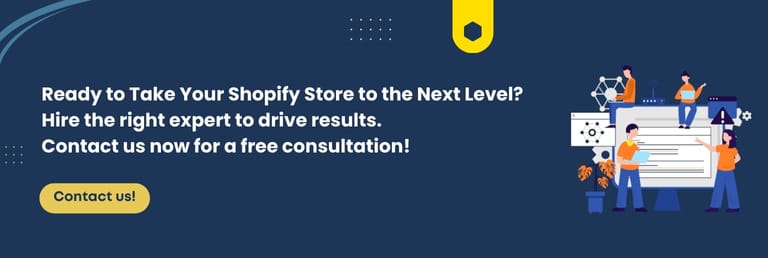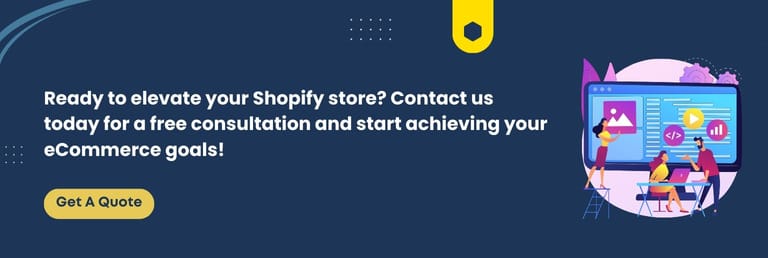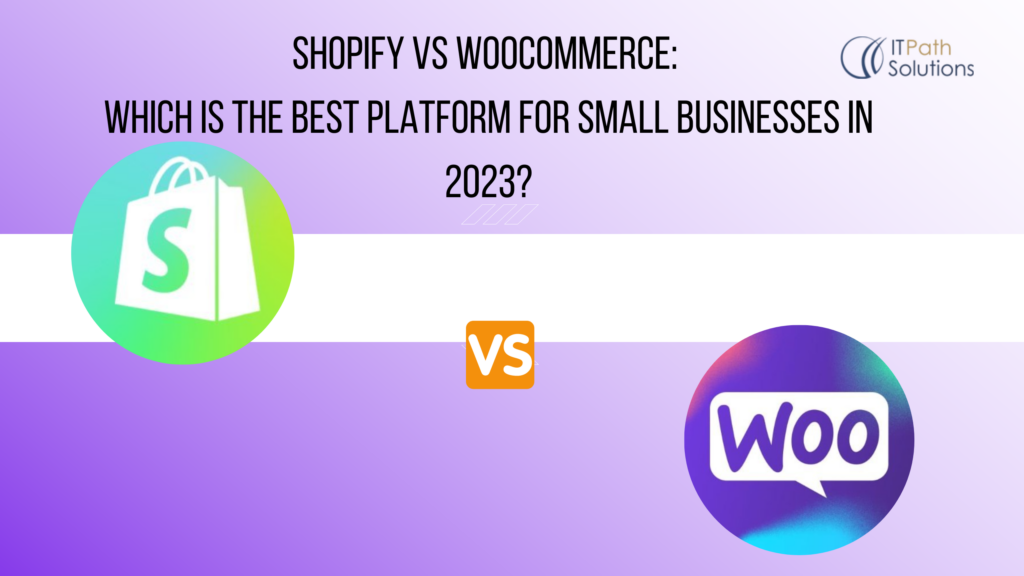How to Hire a Shopify Expert: A Complete Guide for eCommerce Success

As businesses increasingly move online, Shopify has emerged as a leading platform for eCommerce industry. But to truly maximize Shopify’s potential, hiring the right expert can make all the difference. Whether you’re setting up a new store, optimizing your current site, or expanding your online reach, a Shopify expert can save you time, increase efficiency, and help grow your revenue.
This guide dives deep into everything you need to know about hiring a Shopify expert—from understanding their roles to finding the perfect fit for your business. Let’s get started!
Why Hire a Shopify Expert?
1. Specialized Expertise
Shopify experts possess specialized knowledge about the platform—from designing a visually appealing store to integrating third-party apps and improving your site’s performance. Their deep understanding ensures your store not only looks professional but also functions seamlessly.
2. Saves Time and Effort
Setting up and managing a Shopify store requires time and technical know-how. Hiring an expert frees you from the complexities of coding, design, and technical configurations, allowing you to focus on running your business.
3. Boosts Sales and Conversions
A Shopify expert knows how to design with the customer journey in mind. By optimizing navigation, product pages, and checkout flows, they help improve conversion rates and boost your overall sales.
Types of Shopify Experts
Shopify experts specialize in different areas. Here are the main types:
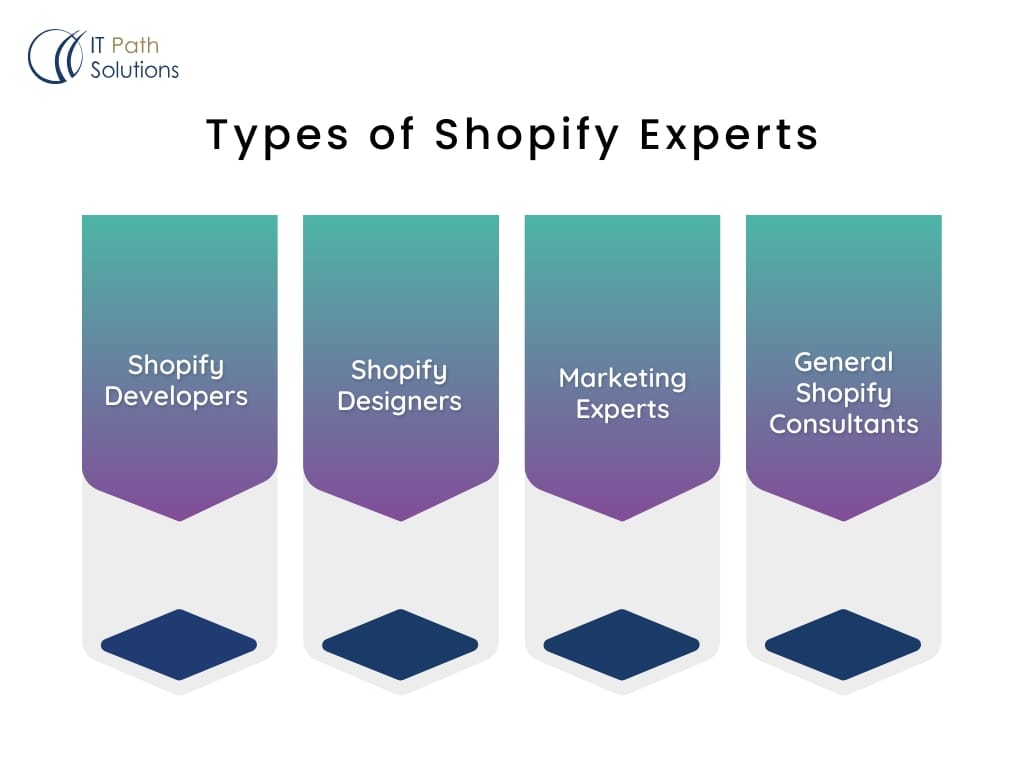
1. Shopify Developers
Focus on the technical side of your store, such as:
- Custom theme development
- API integrations
- Performance optimization
2. Shopify Designers
Specialize in crafting visually appealing and user-friendly store layouts. Services include:
- Branding and custom design
- Mobile-first designs
- Creating unique user experiences
3. Marketing Experts
Help drive traffic and sales by offering:
- SEO optimization
- Social media marketing campaigns
- Email marketing strategies
4. General Shopify Consultants
Offer broad expertise and can guide your overall eCommerce strategy. Ideal for those new to Shopify or looking to scale their store.
While Shopify makes it easy to start an online store, there comes a point when you need professional help to take your business to the next level. But here’s the catch—finding the right expert isn’t as straightforward as it seems. Before you begin your search for the right expert, take a moment to pause and consider what you truly need: freelancers or Shopify agencies. If you’re still uncertain, be sure to check out the section below for more insights.
The Truth About Freelancers vs. Agencies (It’s Not What You Think)
Before you dive into the hiring pool, let’s address the elephant in the room: should you hire a freelancer or an agency? Here’s what nobody tells you:
When to Choose a Freelancer:
- You have a clear, well-defined project with specific deliverables
- Your budget is tight, and you need flexibility
- You want direct communication with the person doing the work
- You’re comfortable managing the project yourself
When to Choose an Agency:
- You need a comprehensive solution involving multiple skill sets
- You want a structured approach with defined processes
- You need ongoing support and maintenance
- You have complex customization requirements
The secret? It’s not always an either-or situation. Many successful store owners work with both—using agencies for major developments and freelancers for quick updates or specific features.
Where to Find Shopify Experts
1. Shopify Experts Marketplace: Your First Stop
The official Shopify Experts Marketplace isn’t just another directory – it’s your gateway to verified talent. Here’s how to make the most of it:
Pro Tips for Using the Marketplace:
- Use the advanced filters to narrow down experts by:
- Project budget range ($1,000-$5,000, $5,000-$10,000, etc.)
- Specific expertise (theme customization, app development, etc.)
- Location and time zone
- Languages spoken
Hidden Features Most Users Miss:
- Sort by “Rising Stars” to find highly skilled experts with competitive rates
- Check the “Response Rate” badge – experts with quick response times often provide better communication
- Look for the “Featured Expert” badge, which indicates consistent high performance
2. Freelance Platforms: Beyond the Basics
Don’t just post a job and hope for the best. Here’s how to leverage each platform effectively:
Upwork Strategy:
- Use the “Rising Talent” filter to find promising experts with competitive rates
- Check their “Job Success Score” – aim for 90% or higher
- Review their work history specifically for Shopify projects
- Look for freelancers who have earned the “Top Rated” or “Top Rated Plus” badge
Fiverr Approach:
- Focus on “Pro” verified sellers for complex projects
- Read the “Service Description” carefully – look for those offering custom packages
- Check their response to negative reviews – it shows their problem-solving attitude
- Use the “Compare Packages” feature to understand service scope
Toptal Technique:
- Perfect for high-end projects requiring exceptional talent
- Expect a more rigorous (but rewarding) hiring process
- Take advantage of their free talent matching service
- Use their trial period to ensure a good fit
3. Shopify Development Agencies: When to Choose Them
Agencies aren’t just for big budgets anymore. Here’s what modern agencies offer:
Types of Agencies to Consider:
- Full-service ecommerce agencies (for complete store management)
- Specialized Shopify agencies (for platform-specific expertise)
- Boutique agencies (for personalized attention)
- Local agencies (for face-to-face collaboration)
Smart Agency Selection Tips:
- Request their standard operating procedures
- Ask about their team structure and who’ll work on your project
- Check their crisis management protocols
- Review their post-launch support packages
What to Look for in a Shopify Expert
1. Experience and Portfolio
Check their experience working on Shopify stores similar to yours. A strong portfolio demonstrates their ability to deliver results.
2. Technical Skills
Depending on your needs, ensure the expert has proficiency in coding (HTML, CSS, JavaScript) or specific tools like Shopify Liquid.
3. Reviews and Testimonials
Look for reviews on platforms like the Shopify Experts Marketplace or freelance websites. Positive testimonials can give you confidence in their abilities.
4. Communication Skills
Clear and effective communication is crucial to ensure your project stays on track. Ensure they understand your goals and can explain their approach clearly.
5. Cost and Budget
Shopify expert rates can vary widely depending on their expertise, location, and the complexity of your project. To avoid surprises, set a clear budget and discuss pricing details upfront.
For a deeper understanding, check out our detailed guide: How Much Does It Cost to Hire a Shopify Expert?. This resource breaks down the factors influencing costs and helps you plan effectively.
Steps to Hire the Right Shopify Expert
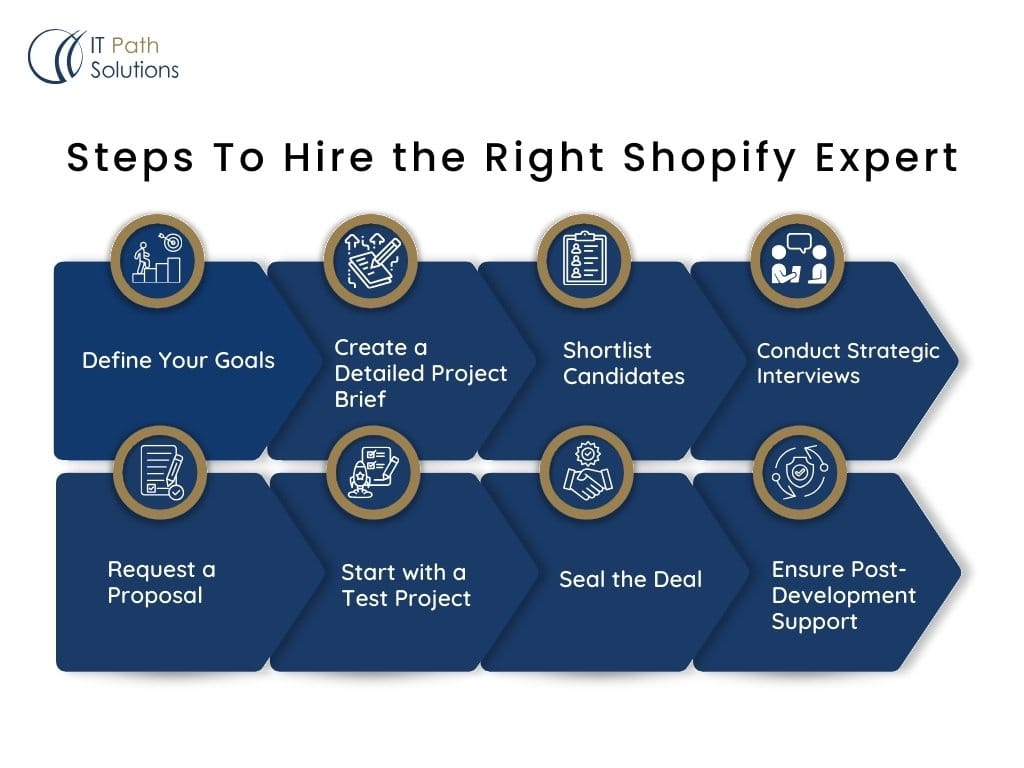
1. Define Your Goals: Build a Solid Foundation
Before searching for a Shopify expert, clearly define what you need. Vague objectives can lead to hiring the wrong person or team, wasting time and resources. Be precise about your goals by answering questions such as:
- Are you launching a new Shopify store? Do you need help setting up the store from scratch, including design, product uploads, payment gateway integration, and testing?
- Are you aiming to redesign your existing store? Identify the specific issues—such as outdated design, poor navigation, or low mobile responsiveness—that you want to address.
- Do you want to improve site performance or conversions? This might include faster page loading, better SEO, A/B testing, and optimizing product pages for conversions.
- Are you looking to set up and manage marketing campaigns? Define your goals for email marketing, PPC campaigns, and social media integration.
Having a clear picture of your objectives will help you find someone with the specific skill set required to meet them. For example, hiring a conversion rate optimization (CRO) specialist differs from hiring someone focused on aesthetic redesigns.
2. Create a Detailed Project Brief: Set Expectations Upfront
A well-prepared project brief is critical for communicating your vision to potential candidates. This document should leave no room for ambiguity and include:
- Business Objectives:
Example: “We want to increase online sales by 30% within six months by improving site design and optimizing product pages.” - Target Audience:
Define your primary audience. For example, if you cater to young professionals in Europe, highlight their buying habits, device preferences, and pain points. - Key Features and Integrations:
Specify functionalities you need, such as:- Multi-currency support for international customers.
- Advanced product filtering or search options.
- Integration with third-party tools like CRM systems, analytics platforms, or inventory management software.
- Design Preferences:
Share examples of stores you admire and branding guidelines, such as preferred colors, fonts, and layouts. - Performance Metrics:
Define measurable outcomes like faster page load times, higher conversion rates, or reduced cart abandonment rates.
Providing a thorough brief ensures clarity and aligns expectations between you and the expert.
3. Shortlist Candidates: Focus on Relevant Experience
Don’t hire the first Shopify expert you come across. Instead, conduct thorough research to build a shortlist of candidates who meet your criteria. Here’s how:
- Review Portfolios:
Look for experts or agencies with experience in your niche. For instance, if you’re running a fashion store in the UK, review their work with similar stores to ensure they understand industry-specific needs like size charts and product categorization. - Check Reviews and Testimonials:
Read reviews from platforms like Clutch, Upwork, or Shopify Experts Marketplace. Prioritize candidates with positive feedback from businesses in similar industries or regions. - Assess Their Communication:
During initial discussions, evaluate how well they understand your project. Do they ask relevant questions? Do they share insights or suggestions? This reflects their expertise and alignment with your goals.
4. Conduct Strategic Interviews: Ask the Right Questions
Once you’ve shortlisted candidates, interview them to assess their skills, expertise, and cultural fit. Key questions to ask include:
- Experience and Case Studies:
“Can you share examples of Shopify stores you’ve worked on in the past? How did you contribute to their success?” - Technical Expertise:
“How would you resolve challenges like slow-loading pages, low conversion rates, or high cart abandonment?” - Tools and Methods:
“What tools do you use to optimize Shopify stores for performance, SEO, and customer experience?” - Work Process:
“How do you ensure projects stay on track and meet deadlines?” - Regional Expertise:
If you’re targeting customers in Europe or the USA, ask: “How do you approach localization for different markets, including currency, language, and tax compliance?”
A good Shopify expert will offer practical, data-driven answers and demonstrate confidence in addressing your challenges.
5. Request a Proposal: Evaluate Their Approach
A detailed proposal helps you understand how the candidate plans to tackle your project. Look for the following in their submission:
- Timeline:
Clear milestones, deadlines, and delivery dates. Ensure the timeline aligns with your business needs. - Deliverables:
Specific outputs for each stage of the project. For example, “Mobile-optimized homepage redesign by Week 3.” - Cost Breakdown:
Transparent pricing for all services, including potential add-ons like ongoing maintenance or marketing. Avoid candidates who offer vague or overly generic pricing.
Carefully review each proposal to ensure it aligns with your goals, budget, and timelines.
6. Start with a Test Project: Minimize Risks
If you’re unsure about committing to a full-scale project, start with a small test task. This could include:
- Designing a landing page or product detail page.
- Integrating a small third-party app or plugin.
- Performing a performance audit of your store.
Evaluate their technical skills, communication, and adherence to deadlines during this test phase. A strong performance indicates their reliability for larger projects.
7. Seal the Deal: Ensure Proper Documentation
Before beginning the project, finalize a formal contract that protects your interests. Key elements to include:
- Scope of work and deliverables.
- Milestones and deadlines.
- Payment terms (e.g., upfront deposit, milestone-based payments).
- Intellectual property rights (ensuring all work belongs to you).
- Confidentiality clauses.
- Post-project maintenance agreements.
- Dispute resolution processes.
A detailed agreement ensures clarity and minimizes the chances of disputes.
8. Ensure Post-Development Support: Think Long Term
Your Shopify store isn’t a one-and-done project—it requires ongoing attention to remain competitive. During negotiations, confirm that the expert provides:
- Bug Fixes: Quick resolution of any post-launch technical issues.
- Regular Updates: Keeping themes, apps, and integrations up to date.
- Documentation and Training: Ensuring your team knows how to manage the store efficiently.
- Scalability Planning: Suggestions for future improvements as your business grows.
Many e-commerce businesses in the USA, UK, and Europe require continuous enhancements to cater to changing market trends. Ensure these services are part of the contract or available as an add-on.
The Bottom Line
Hiring a Shopify expert is an investment in your business’s future. Take your time, do your homework, and remember—the cheapest option rarely turns out to be the most cost-effective in the long run.
Ready to start your search? Begin with a clear understanding of your needs, follow this guide’s framework, and don’t settle for anything less than an expert who truly understands your vision.
Remember: The best Shopify expert isn’t just someone who can code—it’s someone who can transform your ecommerce dreams into reality while keeping your business goals in focus.
 Healthcare
Healthcare  Education
Education  Real Estate
Real Estate  Logistic
Logistic  Themes
Themes
 Plugins
Plugins
 Patterns
Patterns
